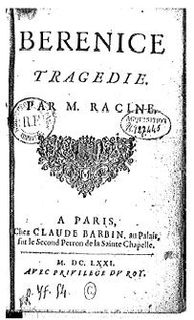 W
WAndromaque is a tragedy in five acts by the French playwright Jean Racine written in alexandrine verse. It was first performed on 17 November 1667 before the court of Louis XIV in the Louvre in the private chambers of the Queen, Marie Thérèse, by the royal company of actors, called "les Grands Comédiens", with Thérèse Du Parc in the title role. The company gave the first public performance two days later in the Hôtel de Bourgogne in Paris. Andromaque, the third of Racine's plays, written at the age of 27, established its author's reputation as one of the great playwrights in France.
 W
WAthalie is a 1691 play, the final tragedy of Jean Racine, and has been described as the masterpiece of "one of the greatest literary artists known" and the "ripest work" of Racine's genius. Charles Augustin Sainte-Beuve deemed it comparable to Oedipus Rex in beauty, with "the true God added." August Wilhelm Schlegel thought Athalie to be "animated by divine breath"; other critics have regarded the poetics of drama in the play to be superior to those of Aristotle.
 W
WBajazet is a five-act tragedy by Jean Racine written in alexandrine verse and first performed at the Hôtel de Bourgogne theatre in January 1672, after Berenice, and before Mithridate. Like Aeschylus in The Persians, Racine took his subject from contemporary history, taking care to choose a far off location, the Ottoman Empire. In 1635, the sultan Murad IV had his brothers and potential rivals Bajazet (Bayezid) and Orcan (Orhan) executed. Racine was inspired by this deed, and centered his play on Bajazet. Racine also develops several romantic subplots in the seraglio. The action is particularly complex, and can only be resolved by a series of deaths and suicides.
 W
WBerenice is a five-act tragedy by the French 17th-century playwright Jean Racine. Berenice was not played often between the 17th and the 20th centuries. Today it is one of Racine's more popular plays, after Phèdre, Andromaque and Britannicus.
 W
WBritannicus is a five-act tragic play by the French dramatist Jean Racine. It was first performed on 13 December 1669 at the Hôtel de Bourgogne in Paris.
 W
WEsther is a play in three acts written in 1689 by the French dramatist, Jean Racine. It was premièred on January 26, 1689, performed by the pupils of the Maison royale de Saint-Louis, an educational institute for young girls of noble birth. The subject is taken from the biblical Book of Esther.
 W
WIphigénie is a dramatic tragedy in five acts written in alexandrine verse by the French playwright Jean Racine. It was first performed in the Orangerie in Versailles on August 18, 1674, as part of the fifth of the royal Divertissements de Versailles of Louis XIV to celebrate the conquest of Franche-Comté. Later in December it was triumphantly revived at the Hôtel de Bourgogne, home of the royal troupe of actors in Paris.
 W
WPhèdre is a French dramatic tragedy in five acts written in alexandrine verse by Jean Racine, first performed in 1677 at the theatre of the Hôtel de Bourgogne in Paris.
 W
WLes Plaideurs, or The Litigants, written in 1668 and published in 1669, is a comedy in three acts with respectively eight, 14, and four scenes, in alexandrine verse by Jean Racine. It is the only comedy he wrote. It was inspired by The Wasps by Aristophanes, but Racine removed all political significance. His play, which he wrote after Andromaque and before Britannicus, was a farce that, surrounded in his work by tragedies, was unexpected.